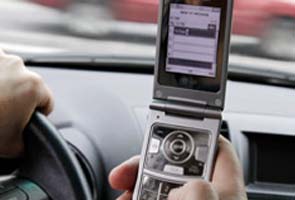In Europe, speed cameras meet their technological match

When Mr. Guerin comes within four kilometers, or two and a half miles, of a speed camera, his Coyote screen warns that he has entered a "risk" zone, and he closely monitors his speed.
Since he began using Coyote three years ago, Mr. Guerin said, he has not received a speeding ticket. He said he used to average three or four tickets a year which cost him about €400, or about $515.
"For one thing, I no longer get caught by the speed cameras, which are all over France," Mr. Guerin said. "For another, it advises me constantly of the legal speed limits and traffic conditions, so I am better informed and much more relaxed when driving."
Smartphone applications have been developed to monitor sleeping babies, open garage doors and analyze the nutritional content of a restaurant meal. Now in Europe, where the police in many countries use stationary and mobile radar cameras to catch speeders, the smartphone is being honed into a highly effective - and controversial - mobile radar detector.
"This type of technology is going to soon be standard in most vehicles," said Serge Bussat, the vice president of sales at Coyote, a company based in Paris whose driving applications are being used by 1.7 million people in Europe, a third of them in France.
Mr. Bussat said that 6 percent of all French drivers now use radar driving apps.
Tolerated in many European countries, the use of radar-detection services like Coyote's, which also monitors a driver's speed against posted limits and advises of traffic jams, was applauded last year by the French government as a useful driver education tool, which helped legitimize the service.
While a law prohibiting radar-detection technology remains on the books in Germany, it is rarely enforced and may be amended to permit some driver alerts.
Only in Switzerland, where border guards are trained to spot and seize radar detection consoles, is the ban still strictly enforced. In the United States, where speed cameras are not as widely used, services like Coyote's, which costs $63 a year or $185 when purchased by the month, are harder to justify. Also, receivers that can detect the Doppler radar waves emitted by police speed guns - like the original Fuzzbusters - are legal in the United States.
But in Europe, Doppler receivers tend to be outlawed and hidden, and permanent cameras are prevalent, so the market for app-based speed camera detection is growing. The two biggest makers of auto navigation devices, Garmin and TomTom, both bundle speed camera alert services with most of their latest products. A string of specialty services has also sprung up, including Coyote in France, Blitzer.de in Germany and Radardroid in Spain.
Most of these companies rely on their users to scout and report the locations of speed cameras, which are then forwarded to others using the same application. Drivers passing the same points are asked to confirm or amend the sightings.
Across Europe, at least 25,000 speed cameras are in use, said Arpad Nemeth, the owner of Poiplaza, a firm in Budapest that manages a database of 4.7 million points of interest logged by their precise geographic coordinates. Mr. Nemeth, a retired television news editor, said the locations of mobile and fixed speed cameras in his database had been compiled by the 80,000 people who had downloaded and used his free application.
Governments in many European countries, Mr. Nemeth said, voluntarily publish the locations of permanent speed cameras, which tend to be installed at sites of frequent accidents. Like Coyote and Radardroid, Mr. Nemeth's Web site warns users that the use of radar detection databases is illegal in Germany and Switzerland. But enforcement, especially of apps on smartphones, is difficult if not impossible, he and others said.
Coyote, while warning of the legal ban in Germany, still provides data on German fixed and mobile cameras to users of its European service. So does Radardroid, a €6 application sold through Google's Android app store that is made by Ventero Telecom of Madrid.
"Our app is being used in Germany right now," said Felix Ventero, the software engineer who created Radardroid, which is used by a million people, mostly in Europe. "The reality is, people are using these services because the technology makes it possible."
Regardless of how prevalent they are, radar detection applications remain controversial and services like Radardroid, which report the exact locations of mobile speed cameras, may have to change to satisfy the concerns of the law enforcement authorities, who view the services as enabling speeding and increasing the risk of injury and death.
Those concerns prompted the French government to force Coyote, which also used to report the exact locations of mobile speed cameras, to amend its practices last year. Coyote now alerts drivers only when they enter a "risk zone," which could mean accident, traffic jam or speed camera. In October 2011, the French government certified Coyote as a helpful education tool.
This week at the Paris Motor Show, which runs through Oct. 14, the French automaker Renault plans to announce that it will install Coyote software on all of its new cars sold next year in seven European markets, said Mr. Bussat, the Coyote executive. Mr. Bussat said negotiations were also taking place with other carmakers in France and Germany.
Renault will not be installing Coyote on cars sold in Germany, where there is opposition to a proposal for a partial lifting of the country's ban on the use of radar detection applications to display the locations of permanent speed cameras.
The Deutsche Polizeigewerkschaft, which represents the country's federal police force, and several German states that earn revenue from speeders, oppose lifting the ban.
"The thinking is that speed cameras, especially those set up near schools or hospitals, serve an educational purpose," said Matthias Knobloch, the manager director of the European Automobile Clubs, a Berlin association that represents auto clubs in Germany and Austria. "Generally, the police view the technology as an obstacle to doing their jobs."
A spokeswoman for Peter Ramsauer, the German transport minister, said the agency was considering a request to amend national laws but had not taken a position. Oliver Luksic, a member of the Bundestag who heads transport policy for the German Free Democrat party, said he was optimistic the German ban would be lifted.
"There are many absurdities in our laws that can be dealt with through this type of modernization," Mr. Luksic, one of two lawmakers who has asked that the ban be lifted, said during an interview. "We are only trying to adapt the code to what is taking place on the streets."
But that kind of logic may not be persuasive enough in Germany.
Mr. Knobloch, the automobile association spokesman, said he doubted that German politicians, faced with opposition from state law enforcement officials and others, would voluntarily lift the ban. But even if the ban remains in effect, the German police will not enforce it, Mr. Knobloch said, because of the difficulties of detecting the application on a smartphone.
So even in Germany, the use of radar-detection apps will spread. "It is hard to stop this type of useful technology," Mr. Knobloch said.
Copyright 2012 The New York Times News Service
Get your daily dose of tech news, reviews, and insights, in under 80 characters on Gadgets 360 Turbo. Connect with fellow tech lovers on our Forum. Follow us on X, Facebook, WhatsApp, Threads and Google News for instant updates. Catch all the action on our YouTube channel.
Related Stories
- Samsung Galaxy Unpacked 2026
- iPhone 17 Pro Max
- ChatGPT
- iOS 26
- Laptop Under 50000
- Smartwatch Under 10000
- Apple Vision Pro
- Oneplus 12
- OnePlus Nord CE 3 Lite 5G
- iPhone 13
- Xiaomi 14 Pro
- Oppo Find N3
- Tecno Spark Go (2023)
- Realme V30
- Best Phones Under 25000
- Samsung Galaxy S24 Series
- Cryptocurrency
- iQoo 12
- Samsung Galaxy S24 Ultra
- Giottus
- Samsung Galaxy Z Flip 5
- Apple 'Scary Fast'
- Housefull 5
- GoPro Hero 12 Black Review
- Invincible Season 2
- JioGlass
- HD Ready TV
- Latest Mobile Phones
- Compare Phones
- Realme P4 Lite
- Vivo V70
- Vivo V70 Elite
- Google Pixel 10a
- Tecno Camon 50
- Tecno Camon 50 Pro
- Lava Bold N2
- Vivo V60 Lite 4G
- LG Gram 14 (2026)
- Asus Vivobook 16 (M1605NAQ)
- Infinix Xpad 30E
- Brave Ark 2-in-1
- Amazfit T-Rex Ultra 2
- boAt Chrome Iris
- Xiaomi QLED TV X Pro 75
- Haier H5E Series
- Asus ROG Ally
- Nintendo Switch Lite
- Haier 1.6 Ton 5 Star Inverter Split AC (HSU19G-MZAID5BN-INV)
- Haier 1.6 Ton 5 Star Inverter Split AC (HSU19G-MZAIM5BN-INV)







![[Partner Content] OPPO Reno15 Series: AI Portrait Camera, Popout and First Compact Reno](https://www.gadgets360.com/static/mobile/images/spacer.png)









